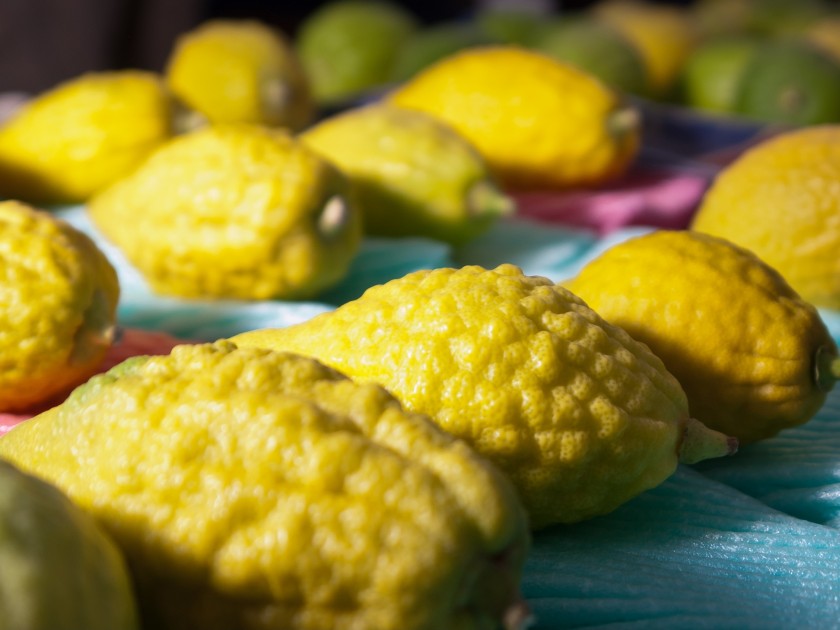
Several rows of etrogs at the market in Bnei Brak
It’s time to bring everything to the table. The kitchen table has always been a sacred and important space for me. It resonates with me that in Jewish tradition the table in the home is associated with the mizbeach, the holy altar in the Temple, the Beit Ha-Mikdash, the House of the Holy, the heart of our sacred universe. This sounds lovely until you make peace with the rough work of worship and sacrifice as known at that time, but the work is real — it’s not just mellifluous words and prayers and heartbreaking supplications but sacrifices, exaltations of spiritual ecstasy, clouds of incense that mix the acrid and unpleasant (galbanum) with the floral and intoxicatingly pungent. It was the original eleven herbs and spices! (Why place the odoriferous among the perfume? One tradition teaches that the galbanum represents the negativity and sin among the people, and the diversity of the spices is the diversity of the souls that join together — for good may overcome the bad, but without all the ingredients, the ketoret, the incense, like the people, is incomplete.)
The same goes for the Four Species that we wave on Sukkot. One has a sweet taste but no smell — the date palm. Another has no taste and no smell — the leaves of the willow. The etrog or citron has a taste and a glorious scent. The myrtle has a fragrance but isn’t edible.
The theme again is that the good will overshadow the bad. The diversity is real and necessary, and without it, the Four Species like the human species is incomplete. We aren’t allowed to forget that despite our differences, we must unite for higher purposes. The incense clouds out the gore and slaughter; the Four Species bring on rain and fertility necessary for growth and change in an otherwise arid climate. Lest we get lost in the poetry, the word for “worship” in Hebrew, avodah, has connotations of work and service as well as spiritual devotion; the work of repairing the wounds of the world, tikkun olam, is hard work.
Yiddishe Ribbenes
This recipe is my answer to making a uniquely Ashkenazi barbecue using spices and flavorings found in an area as diverse as the Baltics to the Balkans. Even the wood used to give a smoky taste — cherry, oak, and apple are deliberate. This recipe requires FLANKEN short ribs, also known in the Jewish world as “Miami ribs,” not the stout, chunky short ribs that are widely known. Long and flat-ish, their thinness makes them ideal for grilling, unlike the thick-cut short ribs, which require long slow cooking such as braising. You could also use the same marinade or mixture with beef back ribs, chicken, lamb, goat, etc., but the cooking method will change according to the type or thickness of the meat. I hope this recipe adds to the fun or re-imagining the Afro-Atlantic art of barbecue as part of Yiddishkeit.
Serves 4
2 pounds short ribs, flaken style
1 teaspoon black pepper
1 teaspoon ginger
2 teaspoons paprika
½ teaspoon cinnamon
1 teaspoon kosher beef or chicken bouillon
1 small onion, finely chopped
2 tablespoons garlic, finely chopped
2 tablespoons oil
2 tablespoons white vinegar
1 – 2 tablespoons prepared white horseradish
1 – 2 tablespoons brown deli mustard
1 tablespoon brown sugar Sprigs of fresh parsley, marjoram, or chives, for garnish (optional)
Flake salt, to taste
Wash the meat and pat it dry. Mix together the pepper, ginger, paprika, and cinnamon and rub into the meat. Mix together the rest of the ingredients, pour over the meat, and marinate 4 – 6 hours.
Prepare your grill according to the manufacturer’s instructions. If using a pellet smoker/grill consider using a mixture of oak and cherry or cherry and apple pellets. If using a charcoal grill or smoker use oak and cherry or cherry and apple wood chips or packets to get smoky flavor.
Grill meat over medium heat, 5 – 7 minutes per side. Wrap loosely in foil and allow to rest for 10 minutes; check for doneness. If you want, garnish with fresh herbs, or use sprigs to mellow with the flanken ribs as they rest in the foil. Sprinkle with flake salt to finish, but use sparingly
Excerpted from KOSHERSOUL by Michael Twitty. Reprinted with permission of the publisher, AMISTAD, an imprint of HarperCollins. Copyright © 2022 by Michael Twitty
Michael W. Twitty is a noted culinary and cultural historian and the creator of Afroculinaria, the first blog devoted to African American historic foodways and their legacies. Twitty has appeared throughout the media, including on NPR’s The Splendid Table, and has given more than 250 talks in the United States and abroad.